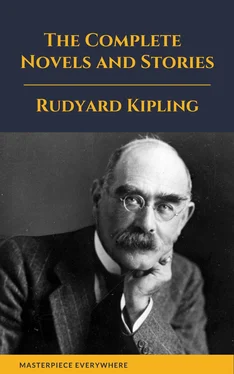But Tarvin, with a choking at the throat, turned his back on it all, and, fighting his way blindly through the crowd which had gathered on the platform, reached the dressing-room behind the stage. He shut and bolted the door behind him, and flung himself into a chair, mopping his forehead.
‘And the man who can do that,’ he muttered, ‘can’t make one tiny little bit of a girl marry him.’
▲▲▲
Who are the Rulers of Ind?—to whom shall we bow the knee?
Make thy peace with the women, and men shall make thee L. G.
—Maxims of Hafiz.
It was an opinion not concealed in Cañon City the next morning, that Tarvin had wiped up the floor with his adversary; and it was at least definitely on record, as a result of Tarvin’s speech, that when Sheriff rose half-heartedly to make the rejoinder set down for him on the programme, he had been howled back into his seat by a united public opinion. But Sheriff met Tarvin at the railway station where they were both to take the train for Topaz with a fair imitation of a nod and smile, and certainly showed no inclination to avoid him on the journey up. If Tarvin had really done Kate’s father the office attributed to him by the voice of Cañon City, Sheriff did not seem to be greatly disturbed by the fact. But Tarvin reflected that Sheriff had balancing grounds of consolation—a reflection which led him to make the further one that he had made a fool of himself. He had indeed had the satisfaction of explaining publicly to the rival candidate which was the better man, and had enjoyed the pleasure of proving to his constituents that he was still a force to be reckoned with, in spite of the mad missionary notion which had built a nest in a certain young woman’s head. But how did that bring him nearer Kate? Had it not rather, so far as her father could influence the matter, put him farther away—as far as it had brought his own election near. He believed he would be elected now. But to what? Even the speakership he had dangled before her did not seem so remote in the light of last night’s occurrences. But the only speakership that Tarvin cared to be elected to was the speakership of Kate’s heart.
He feared he shouldn’t be chosen to fill that high office immediately, and as he glanced at the stumpy, sturdy form standing next him on the edge of the track, he knew whom he had to thank. She would never go to India if she had a man for a father like some men he knew. But a smooth, politic, conciliating, selfish, easy-going rich man—what could you expect? Tarvin could have forgiven Sheriff’s smoothness if it had been backed by force. But he had his opinion of a man who had become rich by accident in a town like Topaz.
Sheriff presented the spectacle, intolerable to Tarvin, of a man who had become bewilderingly well-to-do through no fault of his own, and who now wandered vaguely about in his good fortune, seeking anxiously to avoid giving once. In his politics he carried this far; and he was a treasury of delight just at this time to the committees of railroad engineers’ balls, Knight Templars, excursions, and twilight coteries, and to the organisers of church bazaars, theatricals, and oyster suppers, who had tickets to sell. He went indiscriminately to the oyster suppers and bazaars of all denominations in Topaz, and made Kate and her mother go with him; and his collection of Baptist dolls, Presbyterian embroidery, and Roman Catholic sofa-pillows and spatter-work, filled his parlour at home.
But his universal good-nature was not so popular as it deserved to be. The twilight coteries took his money but kept their opinion of him; and Tarvin, as the opposing candidate, had shown what he thought of his rival’s system of politics by openly declining to buy a single ticket. This feeble-foolish wish to please everybody was, he understood very well, at the root of Sheriff’s attitude toward his daughter’s mania. Kitty wanted to go so bad, he supposed he’d better let her, was his slouching version of the situation at home. He declared that he had opposed the idea strongly when she had first suggested it, and Tarvin did not doubt that Sheriff, who he knew was fond of her, had really done what he could. His complaint against him was not on the score of disposition but of capacity. He recognised, however, that this was finally a complaint, like all his others; against Kate; for it was Kate’s will which made all pleadings vain.
When the train for Topaz arrived at the station, Sheriff and Tarvin got into the drawingroom car together. Tarvin did not yearn to talk to Sheriff on the way to Topaz, but neither did he wish to seem to shirk conversation. Sheriff offered him a cigar in the smoking-room of the Pullman, and when Dave Lewis, the conductor, came through, Tarvin hailed him as an old friend, and made him come back and join them when he had gone his rounds. Tarvin liked Lewis in the way that he liked the thousand other casual acquaintances in the State with whom he was popular; and his invitation was not altogether a device for avoiding private talk with Sheriff. The conductor told them that he had the president of the Three C.’s on behind in a special car, with his party.
‘ No! ’ exclaimed Tarvin, and begged him to introduce him on the spot; he was precisely the man he wanted to see. The conductor laughed, and said he wasn’t a director of the road—not himself; but when he had left them to go about his duties, he came back, after a time, to say that the president had been asking whom he could recommend at Topaz as a fair-minded and public-spirited man, able to discuss in a reasonable spirit the question of the Three C.’s coming to Topaz. The conductor told him that he had two such gentlemen on board his train at that moment; and the president sent word to them by him that he would be glad to have a little talk with them if they would come back to his car.
For a year the directorate of the Three C.’s had been talking of running their line through Topaz, in the dispassionate and impartial manner of directorates which await encouragement. The board of trade at Topaz had promptly met and voted the encouragement. It took the shape of town bonds and gifts of land, and finally of an undertaking to purchase shares of stock in the road itself, at an inflated price. This was handsome even for a board of trade; but, under the prick of town ambition and town pride, Rustler had done better. Rustler lay fifteen miles from Topaz, up in the mountains, and by that much nearer the mines; and Topaz recognised it as its rival in other matters than that of the Three C.’s.
The two towns had enjoyed their boom at about the same time; then the boom had left Rustler and had betaken itself to Topaz. This had cost Rustler a number of citizens, who moved to the more prosperous place. Some of the citizens took their houses up bodily, loaded them on a flat car and sent them over to Topaz as freight, to the desolation of the remaining inhabitants of Rustler. But Topaz now began in her turn to feel that she was losing her clutch. A house or two had been moved back. It was Rustler this time which was gaining. If the railroad went there, Topaz was lost. If Topaz secured the railroad, the town was made. The two towns hated each other as such towns hate in the West—malignantly, viciously, joyously. If a convulsion of nature had obliterated one town, the other must have died from sheer lack of interest in life. If Topaz could have killed Rustler, or if Rustler could have killed Topaz, by more enterprise, push, and go, or by the lightnings of the local press, the surviving town would have organised a triumphal procession and a dance of victory. But the destruction of the other town by any other than the heaven-appointed means of schemes, rustle, and a board of trade, would have been a poignant grief to the survivor.
Читать дальше












